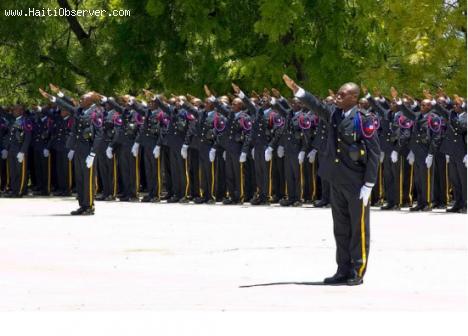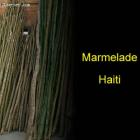ADVERTISEMENT
Hatian National Police - Haiti Observer Blog
Hatian National Police, Haiti Observer Blog. Read the following articles about Hatian National Police
The Haitian National Police Administrative Functions
The Haitian National Police has had a troubled history. Organized under the Haitian Army during Duvalier's rule, its failure to fulfill proposals made by the 1987 Constitution was barred by political turmoil. It suffered from few policing resources and was burdened with responsibilities for drug and border patrol enforcement. Infiltration of its ranks by disgruntled former military officers prevented it from being effective in human rights enforcement.
Both the U.S. and UN Stabilization Mission in Haiti have poured money and resources into building up the HNP's enforcement and administrative capabilities. HNP, with outside help, has managed to build a foundation of basic administrative services under the Central Directorate of the Administrative Police (DCPA).
Haitian National Police Judicial Division
The Haitian National Police (HNP) retains a detective division, the Central Directorate of the Judicial Police (DCPJ). One of HNP's special units, it operates six offices over 30 sections in the country. Headquartered in Clercine, all its services--excluding Police Science and Technology Center--are under one roof.
The DCPJ's purpose is to secure the crime scene, assemble forensic evidence, and look for suspects to bring to trial. Its most important function is to infiltrate organized crime syndicates. The Judicial Police works as well in fighting international crime syndicates in alliance with Interpol, the international police.
Due to the varied kinds of crimes and criminals, who commit them, the Judicial Police adapts their techniques and processes to capture, incarcerate, and bring them to trial.
Haiti National Police Force not Strong Enough to Protect and Enforce
The Haitian National Police (HNP) is an 8,546-member force. Since the Haitian Army was disbanded, it has been the HNP's responsibility to provide security for the country. This number, though, is uncertain, because according to the HNP, the police force has only 5, 892 enforcement officers. The U.S. places the number even lower, somewhere between 3,500 to 4,500.
While Haiti's population of about 10 million; It is being protected by anywhere from 3,500 to 8,546 officers. No one is certain what the strength of Haiti National Police's force is, but even at the highest estimate, it falls well below an adequate number of officers needed to protect Haiti.
Haiti National Police History
Under Jean-Claude Duvalier, the Haitian National Police (HNP) existed as a two-operation department, under the Haitian Army: the Port-au-Prince Police and Rural Security Companies. Post-Duvalier, the 1987 Constitution proposed forming an independent police cadre and police academy, but political turmoil barred this from happening.
After Duvalier, only Port-au-Prince could claim the semblance of a police department. It ran under the control of the Haitian Army. Its capabilities were severely limited, but it bore responsibility for drug and border patrol enforcement, and other criminal matters. Rural Security was not an actual police force. Comprised of soldiers stationed at small posts outside major towns and cities, lower-level military officers acted as police heads.
Haiti National Police Recruitment Standards
One of the biggest problems facing recruitment of police officers in Haiti National Police's history is interference from former military officers (MO) of the Haitian Army. These interlopers have swayed the politics of the HNP, especially in the area of human rights, a necessary part of modern law enforcement. Their influence has led to abuses against politicians, political dissenters, and law-abiding citizens.
The MOs have and continue to be appointed to administrative positions within the Haiti National Police, gravely affecting the recruitment policies of hiring new officer trainees. What has taken place is training officers, some of them MOs, have used orientation and training methods unethical and insufficient in the enforcement areas of human rights violations, drug trafficking, embezzlement, and violent crimes, have corrupted the recruitment, orientation and training, and functioning of the HNP.
Drug Trafficking business And National Police In Haiti
Drug trafficking is a serious issue in Haiti as the country has been a transit point for drug dealers and smugglers. Drug shipments from South America to the United States, Europe, Canada and Caribbean nations usually pass through Haiti and this is why the police force are always on alert. According to reports, drug shipments are made by both sea and air. Even though local production of marijuana is moderate in the country, drug trafficking remains a serious case.
The national police are exerting efforts to clamp down on drug trafficking. Director General Mario Andresol said that since the devastating earthquake in 2010, crimes in Haiti, including drug shipments, are on the rise. He added that the national police are planning to increase their number from 10,000 to 15,000 in three years.
Haitian National Police Protection of the Population May Depend on Better Wages
The Haitian National Police (HNP) has several strikes against their effectiveness as a policing agency. They are known to be among the world's most poorly-performing police forces. Under-recruited, 63 officers protect 100,000 citizens, less than 25% of the Caribbean's protection average of 283 officers per 100,000.
Further weakening their functioning as a policing body is that a considerable number of HNP officers are thought to be participating in violent-crime gang activity, as well as a series of kidnappings. Both the HNP and human rights advocates verify that some members of HNP are operating outside the law.
Haiti Has developed a National Security Plan, Will it solve crime?
Accompanied with the Superior Council of the National Police last Tuesday, Prime Minister Laurent Lamothe appeared before the Permanent Commission of Justice and Public Security of the Chamber of Deputies to discuss a national security plan for Haiti.
What does that mean?
There have been many of such meetings in the past why people in Haiti continues to be victims of violent crime, including armed robbery, homicide, rape, and kidnapping!
According to Prime Minister Laurent Lamothe: "Ensuring security in the country is a priority of the Government". He stated that he had a meeting with the Superior Council of the National Police and they have come to the two following agreements:
Haitian Police Executed close to 19 Prisonners in Les Cayes
According to what the Haitian Joudalist learned, there has been a mass execution execution in a prison in Les Cayes Haiti and this was conducted by the people who was supposed to protect us. The United Nations peacekeeping mission in Haiti says it is investigating the shooting of dozens of prisoners during a jail riot shortly after the earthquake in January.
The New York Time reported that close to 19 Haitian prisoners were killed in execution style. The Haitian police officers stormed the jail in the town of Les Cayes. They opened fire on the unarmed Haitian prisoners, killing between 12 and 19 and injuring more than 40 others.
Can the Haitian Police provide security to quake survivors?
As it was the case for most Haitian institutions, the Haitian Police suffered a severe blow as a result of the 7.0 magnitude earthquake that devastated Haiti.
Haitian Police conceded they had lost their battle to maintain order in Port-au-Prince. Many Haitian gangs have been able to reclaim their old turf since being freed when the national prison collapsed following the earthquake.
In an attempt to maintain order, the Haitian police recently opened fire on looters, killing at least one of them as hundreds of rioters ransacked a market in quake-hit area of Port-au-Prince.
Our objective is to share with you news and information about Haiti and the people of Haiti. Traditions, habits and the way we were or grew are alive in this site. We highly recommend that you Subscribe to our Newsletter and also share with us some of the things that are memorable and made us unique people.


 Black Friday Shopping Season
Black Friday Shopping Season  The Town of Savanette, Haiti
The Town of Savanette, Haiti  Life After Death
Life After Death  Marmelade, Haiti
Marmelade, Haiti  Battle of Vertieres
Battle of Vertieres